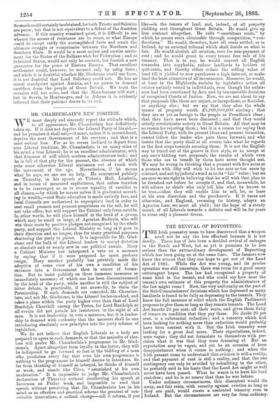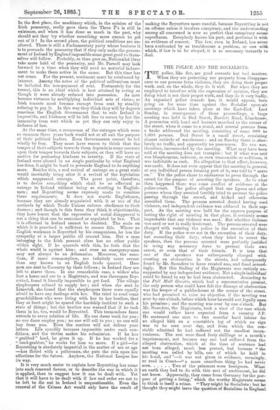THE REVIVAL OF BOYCOTTING.
THE Irish peasantry seem to have discovered that a weapon need not be any the less effectual because it is not deadly. There has of late been a decided revival of outrages in the South and West, but as yet it promises to be less serious than the extraordinary development of Boycotting which has been going on at the same time. The farmers now know the utmost that they can hope to get out of the Land Act of 1881. While the Act was young, and its precise operation was still uncertain, there was room for a good many extravagant hopes. The law had recognised a property of some kind in the tenant, and who could say how near the tenant's own estimate of this property the administrators of the law might come ? Now, the very uniformity on the part of the Sub-Commissioners' decisions which has depressed so many landlords is found to be fully as depressing to the tenants. They know the full measure of relief which the English Parliament proposes to give them so long as they remain tenants. The Land Act knocks 20 per cent. off their rents, and gives them fixity of tenure on condition that they pay them. No doubt 20 per cent. is a substantial reduction ; and a tenantry which had been looking for nothing more than reduction would probably have been content with it. But the Irish tenantry were looking for a great deal more. Their expectations, indeed, were vague ; they did not formulate to themselves with pre- cision what it was that they were dreaming of. But an expectation may be vague, and yet be an occasion of keen disappointment when it comes to nothing ; and when the Irish peasant came to understand that eviction is still a reality, and that payment of rent is still a reality, and that the one contingency can only be avoided by submitting to the other, he probably said in his haste that the Land Act might as well never have been passed. What he wants is to have his land rent-free ; and he is no nearer that than he was before.
Under ordinary circumstances, this discontent would die away, and fair rents, with security against eviction so long as they are paid, would create a contented tenantry even in Ireland. But the circumstances are very far from ordinary. In the first place, the machinery which, in the opinion of the Irish peasantry, really gave them the Three F's is still in existence, and when it has done so much in the past, why should not they try whether something more cannot be got out of it ? In the second place, the political conditions are un- altered. There is still a Parliamentary party whose business it is to persuade the peasantry that if they only make the govern- ment of Ireland by England impossible some great good to them- selves will follow. Probably, as time goes on, Nationalist ideas take more hold of the peasantry, and Mr. Parnell may look forward to a time when they will need no material induce- ment to make them active in the cause. But this time has not come. For the present, sentiment must be reinforced by interest. Among the notes of the political millennium must be included the non-payment of rent. Fortunately for the tenant, this is an ideal which is best attained by acting as though it were already reduced into possession. As men become virtuous by multiplying individual acts of virtue, so Irish tenants must become exempt from rent by steadily refusing to pay it. In this way they think they will by degrees convince the English Government that to rule Ireland is impossible, and Irishmen will be left free to secure by law the immunity from rent which as yet they can only enjoy in defiance of law.
At the same time, a recurrence of the outrages which were so common three years back would not at all suit the purpose of their political leaders. Even Governments cannot be led wholly by fear. They must have reason to think that the temper of their subjects towards them depends in some measure upon their temper towards their subjects, or they will have no motive for preferring kindness to severity. If the state of Ireland were altered in no single particular by what England has done, it might be hard to persuade England to do anything more. Besides this, a real revival of outrage on a great scale would inevitably bring after it a revival of the legislation which suppressed outrage. The great point, therefore, is to devise something which shall be as effectual as outrage in Ireland without being as startling to English- men ; and Boycotting seems expressly made to combine these requirements. It does not startle Englishmen, because they are already acquainted with it as one of the methods by which Trade Unions enforce obedience to their decrees ; and though in this form they think it objectionable, they have learnt that the expression of social disapproval is not a thing that can be restrained or regulated by law. That it is effectual in Ireland cannot be doubted. The scale on which it is practised is sufficient to ensure this. Where an English workman is Boycotted by his companions, he has the sympathy of a larger public all around him. But a man belonging to the Irish peasant class has no other public within sight. If he quarrels with this, he feels that the whole world is against him ; and even an emergency-man may not always be an Athanasius. Moreover, the sanc- tions, if more commonplace, are infinitely more severe than any known in an English trade quarrel. Here men are sent to Coventry by their fellows ; in Ireland they are left to starve there. In one remarkable case, a widow who lent a horse and car to a Magistrate, and was thereupon Boy- cotted, found it literally impossible to get food. The village shopkeepers refused to supply her ; and when she sent to Limerick, she found that the shopkeepers there were equally afraid to have any dealings with her. She tried to send some grandchildren who were living with her to her brother, that they at least might be spared the hardship incident to such a state of things ; but the brother was warned that if he took them in he, too, would be Boycotted. This tremendous force extends to every relation of life. No one dares work for you; no one dares employ you ; no one will sell to you ; no one will buy from you. Even the carriers will not deliver your letters. Life speedily becomes impossible under such con- ditions, and the victim makes his submission. If he has "grabbed" land, he gives it up. If he has worked for a " land-grabber," he works for him no more. If a girl—for Boycotting is absolutely impartial in the matter of sex or age —has flirted with a policeman, she puts the rein upon her affections for the future. Anyhow, the National League has its way. It is very much easier to explain how Boycotting has come into such renewed favour, or to describe the way in which it is applied, than to suggest how it can be dealt with. Yet that it will have to be dealt with if law and order are not to be left to die out in Ireland is unquestionable. Even the renewal of the Crimes Act would only have the result of making the Boycotters more careful, because Boycotting is not an offence unless it involves conspiracy, and the understanding among all concerned is now so perfect that conspiracy seems superfluous. Everybody knows his part, and performs it with no evidence of concert. The law, even in Ireland, has never been confronted by so troublesome a problem, or one with which, if law is to be obeyed, it is so necessary instantly to deal.



































 Previous page
Previous page